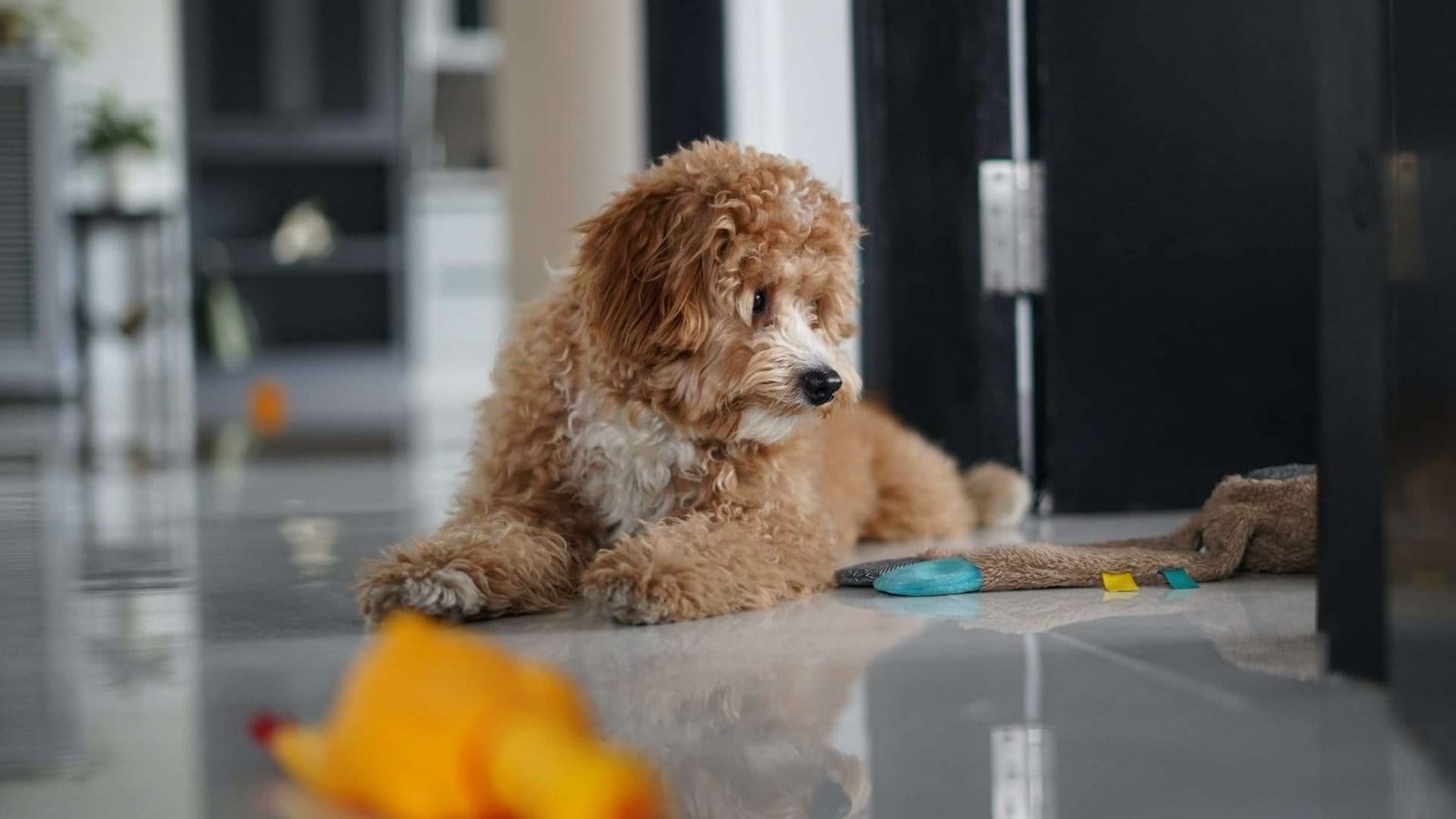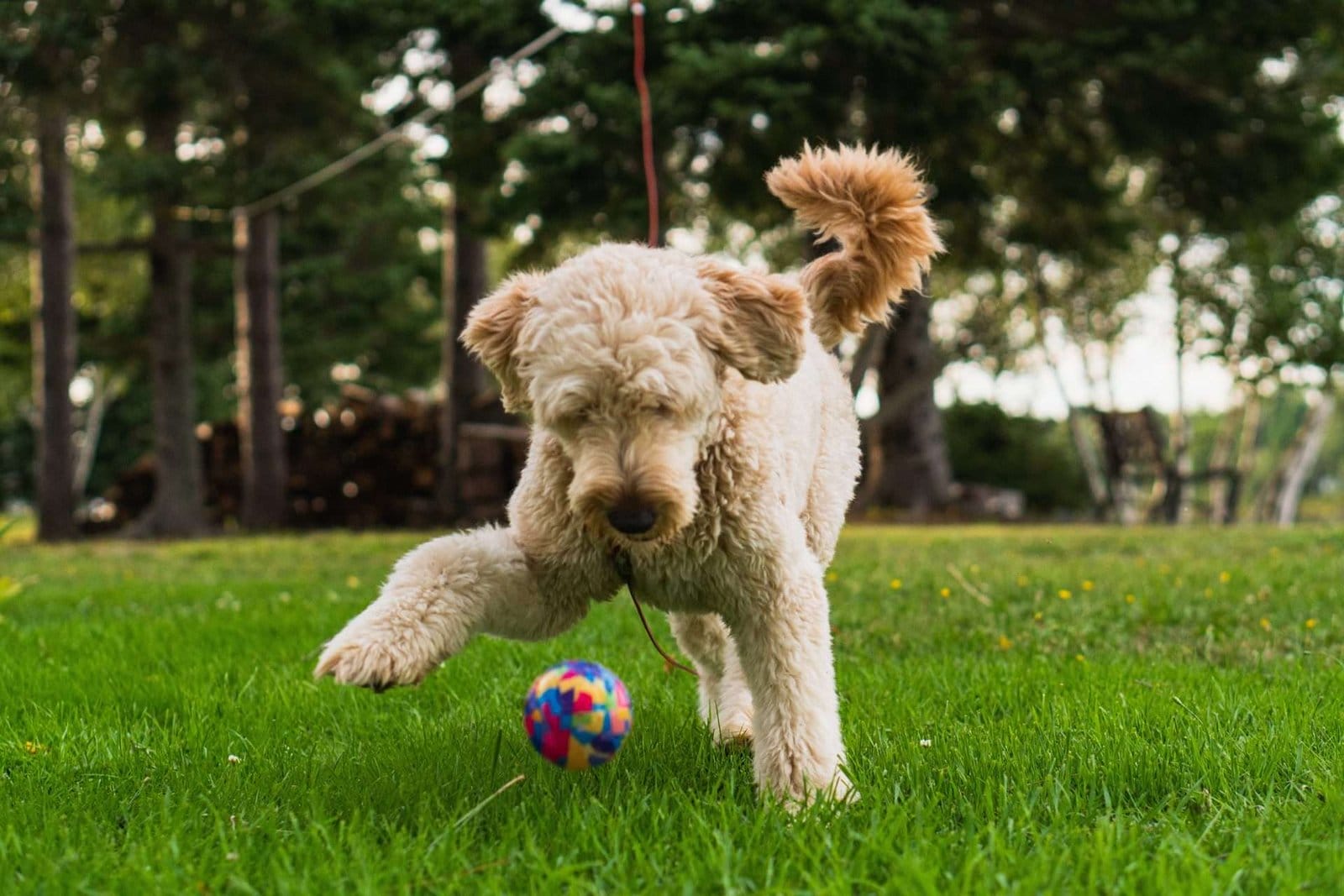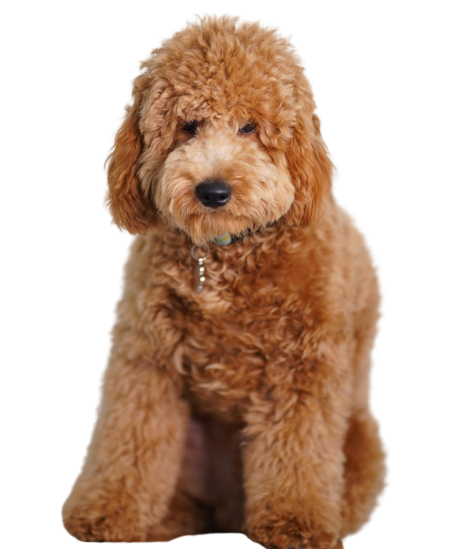Welcoming a new baby into your home is a joyous occasion, but it can also bring about changes, especially for your furry friend. If you’re a proud Mini Goldendoodle owner, preparing your puppy in advance is essential to ensure a harmonious introduction.
Preparing your mini goldendoodle puppy ahead of time is crucial for smoothly integrating a new baby into your home. This guide will delve into the training, socialization, and adjustments required to make this transition as seamless as possible.
Key Takeaways
- Solidify basic commands to ensure your dog has impulse control around baby items.
- Familiarize your puppy with baby sounds and smells to reduce anxiety and curiosity.
- Establish a consistent routine before the baby arrives to minimize disruptions.
- Designate a baby-free zone to give your dog a safe space.
- Maintain one-on-one time with your dog to prevent feelings of neglect or jealousy.
Get Your Mini Goldendoodle Solid on Basic Commands
Before you introduce your dog to your new baby, it’s vital to ensure they’re well-versed in basic commands. This foundation will help in managing their behavior around the newborn.
- Sit, Stay, down: These commands are fundamental. When your dog knows to sit or stay on cue, it’s easy to control their movements, especially when you’re handling the baby.
- Leave It, Drop It: These commands are crucial when your dog gets curious about baby items. If they pick up a toy or any baby accessory, a firm “drop it” ensures they let go immediately.
- Reinforcement Training: After the baby arrives, continue to praise and reward your dog for obeying commands. This reinforces positive behavior and ensures they remain obedient even with the new changes.
By investing time in these commands, you not only ensure safety but also help your dog feel comfortable and less anxious around the baby.
Socialize Your Puppy to Baby Experiences
When a new baby is on the horizon, your home undergoes a transformation. Sounds, smells, and even the daily routine can shift dramatically. For your puppy, this change can be a whirlwind of new experiences. It’s essential to help them navigate this transition.
Baby sounds, especially cries, can be startling for dogs. Before your baby arrives, consider playing recordings of baby noises. This exposure allows your dog to become familiar with these sounds. When they react calmly, reward them with a treat or some praise, reinforcing positive behavior.
The unique smell of a newborn is another aspect your dog will need to get used to. A good practice is to let your dog sniff baby items, such as blankets or worn clothes. This helps them associate the scent with something non-threatening.
New gear, like strollers or baby carriers, can be curious items for your puppy. Walk your dog on a leash around these items, ensuring they remain calm and relaxed. If they show signs of anxiety or over-excitement, it’s essential to correct this behavior early on.
Lastly, teaching your dog gentle interaction techniques is crucial. Encourage behaviors like a soft paw touch or a calm sniff around baby items. Over time, these positive interactions will become second nature to them.
By taking these steps, you’re not only preparing your puppy for the baby’s arrival but also ensuring a harmonious relationship between them from day one.

Establish a Routine Early On
A consistent routine provides comfort and predictability for your puppy. By setting up a routine before the new baby arrives, you help your dog adjust to the changes more easily. This routine should encompass feeding times, walks, and play sessions.
When your puppy knows what to expect, it reduces anxiety and uncertainty. For instance, if your dog is accustomed to a morning walk, try to maintain that even after the baby’s arrival. This consistency reassures your dog and prevents feelings of neglect.
Moreover, a set routine ensures your puppy still receives the attention it deserves. It’s not uncommon for pets to feel left out when a new family member comes into the picture. By sticking to a routine, you show your dog that it remains an integral part of the family.
As the baby’s arrival date approaches, simulate potential changes in the routine. This proactive approach allows your dog to gradually adjust, ensuring a smoother transition for everyone.
Prepare a Baby-Free Zone
Every puppy cherishes a personal sanctuary—a place to retreat and feel safe. With the arrival of a new baby, creating such a space becomes even more crucial. Consider designating a specific room, a crate, or a cozy corner in your home that’s “off-limits” for the baby.
In this zone, safety is paramount. It’s a haven where your dog can relax without the unpredictability of a baby around. Here, toys, food, and water are always within reach, and there’s no risk of a curious baby grabbing a tail or ear.
When introducing your puppy to this space, shower them with praise and treats. This positive association ensures they view this area as a delightful retreat rather than a form of isolation. But remember, balance is key. While it’s essential to have a baby-free zone, your puppy shouldn’t feel excluded from family activities. They need to mingle and be part of the household’s daily rhythm.
Consistency in rules is another cornerstone. If, for instance, the living room becomes off-limits during the baby’s tummy time, it should remain so every time. Such consistency helps your dog understand and respect the boundaries set.
In essence, a baby-free zone isn’t just about keeping spaces separate. It’s about harmony, ensuring both your new baby and furry friend have their own safe havens while still feeling loved and included.
Adjust Exercise Schedules Gradually
With a new baby in the house, your daily routines are bound to shift. Your Mini Goldendoodle’s exercise schedule might see some changes too. But remember, a well-exercised puppy is a content one. It’s essential to ensure your dog still gets the physical activity they crave, even amidst the baby chaos.
You might find it challenging to juggle baby duties with long walks or play sessions. Here’s where family or friends can step in. Recruiting a family member to help with dog walking can be a lifesaver. It not only ensures your dog gets exercise but also provides a bonding opportunity for the walker and the dog.
Considering doggy daycare a few days a week can also be beneficial. It’s a place where your dog can socialize, play, and burn off energy. On days when daycare or walks aren’t feasible, interactive toys can be a godsend. These toys keep your dog mentally stimulated and physically active, even when alone at home.
It’s all about flexibility and adaptation. Your dog’s exercise routine might not look the same as it did pre-baby, but with some creativity and assistance, you can ensure they remain active and happy.
Exercise Adjustments for Your Mini Goldendoodle During Baby’s Introduction:
| Exercise Option | Benefits | Helpers/Tools |
| Family-assisted dog walking | Maintains routine, bonding | Family members |
| Doggy daycare | Socialization, energy expenditure | Local daycare centers |
| Interactive toys | Mental stimulation, solo play | Puzzle toys, treat-dispensing toys |
Be Patient and Encourage Calm Behavior
Introducing a new baby to your home is a significant change for everyone, including your Mini Goldendoodle. During this transition, it’s crucial to practice patience with your puppy and guide them towards calm interactions with the baby.
When your dog approaches the baby, always supervise it closely. Praise them for calm and gentle interactions. This positive reinforcement helps them understand the desired behavior around the baby. On the flip side, if they get too excited, jump, or show over-exuberance, it’s essential to correct them gently but firmly.
There might be moments when your dog seems overwhelmed by the baby’s presence. In such cases, give them some space. Let them retreat to their safe zone or crate. It’s a place where they can relax and regroup.
Remember, every dog will react differently. Some might take to the baby immediately, while others might need more time. By being patient, consistent, and encouraging calm behavior, you’ll set the stage for a harmonious relationship between your Mini Goldendoodle and your new baby.

Maintain One-on-One Time
The arrival of a new baby can be overwhelming for parents. Amidst the joy and excitement, it’s essential not to forget about your Mini Goldendoodle. They’ve been your loyal companion, and they too need assurance that they’re still loved and valued.
Carve out some special moments just for your puppy. These moments can be as simple as a short walk around the block or a quick play session in the backyard. This one-on-one time helps reinforce the bond between you and your dog, ensuring they don’t feel left out or neglected.
Jealousy can arise if your dog feels they’re no longer the center of attention. To prevent this, try to spend quality time with them, even if it’s just a few minutes a day. This dedicated time can be a game-changer in making your dog feel secure and loved amidst the changes.
Another tip is to involve your dog in baby-related activities. For instance, when you’re feeding or changing the baby, allow your dog to sit by your side. This inclusion helps them associate the baby with positive experiences and reinforces the idea that the baby is a part of the family.
By maintaining one-on-one time and ensuring your Mini Goldendoodle feels included, you’ll pave the way for a loving relationship between your dog and your new baby.
Expect Some Regressions
Change isn’t easy for anyone, and your Mini Goldendoodle is no exception. As you introduce your dog to the new family dynamics, it’s natural to witness some behavioral regressions. These can manifest as accidents in the house, sudden bouts of barking, or even some naughty behavior that they had previously outgrown.
First, understand that this is a normal response. Your dog is trying to navigate the new sounds, smells, and routines that come with a new baby. They might be feeling anxious or uncertain about their place in the family.
When these regressions occur, it’s crucial to approach them with patience and understanding. Scolding or punishing your dog might only exacerbate their anxiety. Instead, revert to some basic training techniques. Positive reinforcement, such as praise or a treat, can be effective in reminding them of the desired behavior.
If your dog has an accident in the house, clean it up calmly without making a fuss. If they bark excessively, try to identify the trigger and address it. Perhaps they’re reacting to the baby’s cry or a new toy that makes a noise they’re not familiar with.
In some cases, seeking advice from a professional dog trainer or behaviorist can be beneficial. They can offer tailored strategies to help your dog adjust and provide guidance on reinforcing positive behavior.
Remember, this period of adjustment is temporary. With time, patience, and consistent training, your Mini Goldendoodle will settle into its new role as a protective and loving sibling to your baby.
If juggling baby and dog time feels tough, try setting a routine. Even 10 minutes daily can make your dog feel loved and included. Remember, while your baby needs care, your dog also needs to feel like part of the family. With some planning, you can give them the attention they deserve.
Wrapping Up
Welcoming a new baby into your home is a joyous occasion, but it also comes with its set of challenges, especially when you have a Mini Goldendoodle puppy. By taking proactive steps, you can ensure that both your dog and baby coexist harmoniously.
- Consistency is Key: Keeping a consistent routine for your dog, even with the arrival of the baby, helps reduce anxiety and uncertainty.
- Communication: Always observe your dog’s body language. It tells you a lot about how they’re feeling and adjusting.
- Seek Support: If you’re feeling overwhelmed, don’t hesitate to ask for help. Whether it’s family, friends, or professionals, there’s a community ready to assist.
- Celebrate Small Wins: Every positive interaction between your dog and baby is a step forward. Celebrate those moments and use them as motivation.
In the end, the goal is to create a loving environment where both your Mini Goldendoodle and your baby thrive. With patience, understanding, and a bit of preparation, you’ll be well on your way to creating lifelong memories with your growing family.

